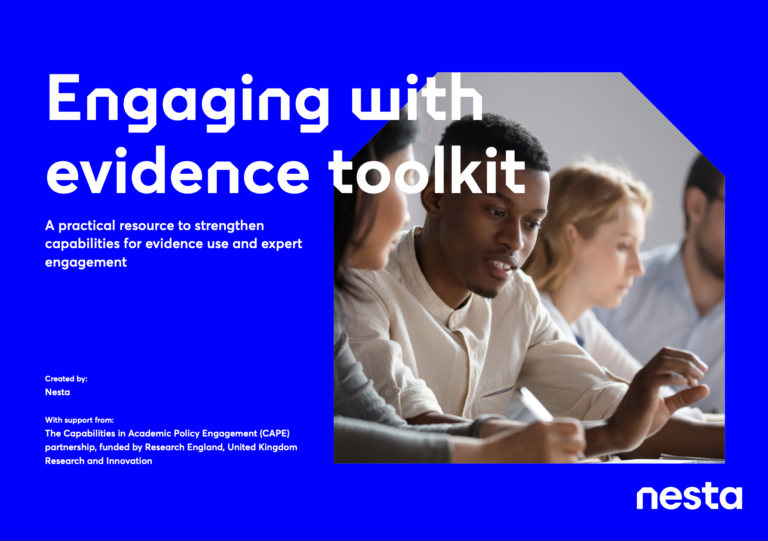Training
Our training workstream was run by our project partner Nesta. This involved two approaches, the first focused on improving evidence use and academic engagement capability for decision-makers, and the second for improving policy engagement capacity for university-based researchers and knowledge brokers.
Through these two activities, CAPE sought to improve the quality, accessibility and agility of research into decision-making. To make evidence-informed decision making a reality, we need to equip decision-makers, researchers and knowledge brokers alike with the capabilities, motivation, and opportunities that enable behaviour change towards greater collaboration and knowledge exchange.
Training for Policy Professionals
Building upon Nesta’s breadth of expertise in providing evidence use and scrutiny training to policy professionals and practitioners, CAPE co-created and delivered a learning programme for policy professionals to develop the knowledge, attitudes, and skills to foster greater evidence use and academic engagement, and to allow for the creative exploration of barriers, and potential solutions, that help enable the sustainability of this learning within unique institutional contexts. By employing a co-creative approach, learning was related to the live policy problems of our policy professionals, and reflected their decision-making environments.
Through the delivery of this training, Nesta ultimately aimed to ensure government services are designed and delivered on the basis of the best available evidence to ensure they are effective and support the best possible outcomes for recipients of these services.
Resources
Engaging with Evident Toolkit
A toolkit on how to utilise, synthesise, scrutinise, and engage with evidence and expertise for policy development.
Community of Practice for Knowledge Mobilisers
In close partnership with Nesta, CAPE is facilitating a programme dedicated to understanding, aligning and improving policy engagement learning offers in higher education institutions.
First, Nesta will identify and map existing training providers and courses focused on research translation and policy engagement available to CAPE partner universities, and identify gaps in their current provision for the development of new training and skills that are focussed on practical implementation. They will then bring together expertise from across the policy-academic engagement sector to co-design content that addresses these gaps and equips learners with an improved understanding of public policy and practical skills for policy engagement and research translation. Through the co-creation of a community-of-practice and train-the-trainer resources, we’ll then widely share training content that is replicable and adaptable to unique university contexts.
